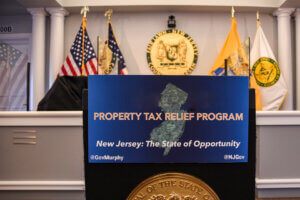Has the 21 st century’s first decade been kind to New Jersey residents? Well, the Monmouth University/Gannett New Jersey Poll found that it depends on who you talk to. When asked how the quality of their life has changed over the past ten years, Garden State residents are evenly divided, with about one-third saying that their life has either gotten better (30%), or gotten worse (34%), or stayed about the same (31%) as it was in 2000. Nearly half (48%), though, expect that the next ten years will be brighter for them.
Young adults under age 30 are the most likely to say that the 21 st century has treated them well so far – 39% of this age group say their quality of life has improved, compared to just 25% who say it has gotten worse. Other post-Baby Boomers tend to be slightly more positive than negative about changes in their life since 2000. Among New Jerseyans age 30 to 49, 35% say their life has improved and 31% say it has gotten worse.
The half-century crowd is least satisfied with how the past decade has treated them. Among those age 50 to 69 years old, 44% say their life has worsened, compared to only 24% who say it has gotten better. Among the oldest New Jerseyans – those age 70 and up – 38% say their quality of life has gotten worse since 2000, while only 14% say it has improved. However, the largest portion of this age group (45%) say that their quality of life has remained the same.
The survey also found that black and Hispanic New Jerseyans are more positive than white state residents when looking back on how their life has changed in the past decade. Fully 4-in-10 black (40%) and Hispanic (40%) adults say that their quality of life has improved since 2000, while only 1-in-4 white (26%) residents say the same.
Black New Jerseyans are also less likely than most other groups to say their lives have gotten worse (24%), with another 30% saying there has been no change.
Just over one-third of Hispanics (35%) say the quality of their lives has gotten worse, nearly off-setting the 40% of this group whose lives have improved. Only 19% of Hispanic New Jerseyans say their quality of life has not changed since 2000, making this the group most likely to have experienced change, either positive or negative, in life quality over the past 10 years.
Among white state residents, 38% say their quality of life has worsened, with another 32% saying it has remained stable since the new millennium began.
“It’s been an uneven decade for Garden State residents. For every person who reports that their life has improved, there is another person somewhere in New Jersey whose quality of life has declined,” said Patrick Murray, director of the Monmouth University Polling Institute.
The poll found that New Jerseyans are somewhat more optimistic about the 21 st century’s second decade, though. Nearly half (48%) expect that their quality of life will get better in the next ten years, compared to only 18% who say it will get worse, and 23% who expect it to remain the same.
Again, young people are the most positive. Fully 7-in-10 (70%) of New Jerseyans between the ages of 18 and 29 say that their future will be brighter, followed by just over half (52%) of 30 to 49 year olds who feel the same. Only 35% of those age 50 to 69 and 29% of those age 70 or older believe that their quality of life will be markedly better by 2020.
Similarly, black (66%) and Hispanic (68%) New Jerseyans feel that the next ten years will bring about a better quality of life for themselves, compared to fewer than half of whites (41%) and Asians (49%) who feel the same.
It’s also interesting to see if past performance drives future expectations when it comes to one’s quality of life. Overall, about 1-in-5 New Jerseyans (20%) can be viewed as extremely optimistic about their lives. These are people who say that their quality of life has gotten better over the past ten years and they expect that upward trend to continue into the next ten. Another 28% are optimistic about improving their lot in the next few years – this includes 14% whose quality of life did not change in the past decade and 14% whose life got worse but hold out hope for better days ahead.
Another 16% of the public are part of the “steady sailing” crowd – they have experienced a stable or improved life situation since 2000 and expect no further changes in the foreseeable future.
Residents with pessimistic views comprise one-quarter (25%) of the New Jersey public, including those who say their life will worsen in the next decade and those whose life has worsened since 2000 with no expected change in their circumstances. The remaining 10% of Garden State residents are unsure what the future holds.
The Monmouth University/Gannett New Jersey Poll was conducted by telephone with 1,753 New Jersey adults from October 28 to 30, 2009. This sample has a margin of error of ± 2.4 percent. The poll was conducted by the Monmouth University Polling Institute and originally published by the Gannett New Jersey newspaper group (Asbury Park Press, Courier-Post, Courier News, Daily Journal, Daily Record, and Home News Tribune).
DATA TABLES
The questions referred to in this release are as follows:
(* Some columns may not add to 100% due to rounding.)
1. The year 2010 marks the start of the second decade of the 21st century. Thinking about your own life now, would you say your quality of life has gotten better, gotten worse, or stayed the same during the first ten years of the 21st century, that is since the year 2000?
|
TOTAL | GENDER | AGE |
RACE | ||||||||
|
Male | Female | 18-29 | 30-49 | 50-69 | 70+ | White | Black | Hispanic |
Asian | ||
| Better | 30% | 30% | 30% | 39% | 35% | 24% | 14% | 26% | 40% | 40% | 29% |
| Worse | 34% | 37% | 32% | 25% | 31% | 44% | 38% | 38% | 24% | 35% | 14% |
| Same | 31% | 28% | 33% | 32% | 28% | 29% | 45% | 32% | 30% | 19% | 52% |
| (VOL) Mixed | 3% | 3% | 3% | 1% | 4% | 2% | 2% | 2% | 4% | 3% | 2% |
| (VOL) Don’t know | 2% | 2% | 2% | 2% | 2% | 2% | 2% | 2% | 1% | 2% | 3% |
| Unwtd N |
1,753 | 847 | 906 | 219 | 739 | 525 | 195 | 1390 | 132 | 112 |
52 |
|
TOTAL |
REGION OF STATE | |||||||
|
North- | Urban Core | Route 1 Corridor | Central Hills | Northern Shore | Delaware Valley |
Garden | ||
| Better | 30% | 28% | 35% | 32% | 31% | 26% | 31% | 31% |
| Worse | 34% | 32% | 32% | 35% | 32% | 37% | 33% | 38% |
| Same | 31% | 35% | 29% | 29% | 30% | 33% | 34% | 27% |
| (VOL) Mixed | 3% | 2% | 4% | 3% | 3% | 3% | 2% | 1% |
| (VOL) Don’t know | 2% | 3% | 0% | 0% | 4% | 2% | 1% | 2% |
| Unwtd N |
1,753 | 297 | 218 | 299 | 228 | 273 | 225 |
172 |
2. Do you think your quality of life will get better, get worse, or stay the same during the next ten years?
|
TOTAL | GENDER | AGE |
RACE | ||||||||
|
Male | Female | 18-29 | 30-49 | 50-69 | 70+ | White | Black | Hispanic |
Asian | ||
| Better | 48% | 49% | 48% | 70% | 52% | 35% | 29% | 41% | 66% | 68% | 49% |
| Worse | 18% | 22% | 15% | 9% | 17% | 25% | 22% | 21% | 7% | 11% | 24% |
| Same | 23% | 20% | 25% | 12% | 22% | 29% | 31% | 27% | 15% | 16% | 14% |
| (VOL) Mixed | 2% | 2% | 2% | 2% | 3% | 0% | 1% | 2% | 0% | 1% | 5% |
| (VOL) Don’t know | 9% | 7% | 10% | 6% | 7% | 10% | 17% | 9% | 11% | 4% | 8% |
| Unwtd N |
1,753 | 847 | 906 | 219 | 739 | 525 | 195 | 1390 | 132 | 112 |
52 |
|
TOTAL |
REGION OF STATE | |||||||
|
North- | Urban Core | Route 1 Corridor | Central Hills | Northern Shore | Delaware Valley |
Garden | ||
| Better | 48% | 50% | 56% | 46% | 42% | 45% | 57% | 42% |
| Worse | 18% | 18% | 14% | 17% | 23% | 20% | 15% | 24% |
| Same | 23% | 22% | 19% | 26% | 26% | 26% | 22% | 19% |
| (VOL) Mixed | 2% | 1% | 0% | 3% | 3% | 3% | 1% | 2% |
| (VOL) Don’t know | 9% | 8% | 11% | 8% | 7% | 7% | 5% | 13% |
| Unwtd N |
1,753 | 297 | 218 | 299 | 228 | 273 | 225 |
172 |
The Monmouth University/Gannett New Jersey Poll was conducted and analyzed by the Monmouth University Polling Institute research staff. The telephone interviews were collected by Braun Research on October 28-30, 2009 with a statewide random sample of 1,753 New Jersey adults. For results based on this sample, one can say with 95% confidence that the error attributable to sampling has a maximum margin of plus or minus 2.4 percentage points. Sampling error increases as the sample size decreases, so statements based on various population subgroups, such as separate figures reported by gender or party identification, are subject to more error than are statements based on the total sample. In addition to sampling error, one should bear in mind that question wording and practical difficulties in conducting surveys can introduce error or bias into the findings of opinion polls.
It is the Monmouth University Polling Institute’s policy to conduct surveys of all adult New Jersey residents, including voters and non-voters, on issues which affect the state. Specific voter surveys are conducted when appropriate during election cycles.
Click on pdf file link below for full methodology and results by key demographic groups.




